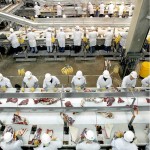NOBULL: Beef’s Raw Edges: Processed meat more dangerous , By Mike McGraw
The following is the first in a three-part series, continuing tomorrow and Tuesday:
Beef’s Raw Edges
By MIKE MCGRAW | The Kansas City Star
The Kansas City Star, in a yearlong investigation, found that the beef industry is increasingly relying on a mechanical process to tenderize meat, exposing Americans to higher risk of E. coli poisoning. The industry then resists labeling such products, leaving consumers in the dark.
The result: Beef in America is plentiful and affordable, spun out in enormous quantities at high speeds, but it’s a bonanza with hidden dangers. Industry officials contend beef is safer than it’s ever been.
Increasingly, Big Beef runs mega-plants to produce high volumes of meat quickly. The Tyson Fresh Meats facility in Dakota City, Neb., is the largest beef plant in the world, employing some 4,000 workers on 26 acres under one roof.
Lamkin
SIOUX CITY, Iowa
Margaret Lamkin doesn’t visit her grandchildren much anymore. She never flies. She avoids wearing dresses. And she worries about infections and odors.
Three years ago, at age 87, Lamkin was forced to wear a colostomy bag for the rest of her life after a virulent meat-borne pathogen destroyed her colon and nearly killed her.
What made her so sick? A medium-rare steak she ate nine days earlier at an Applebee’s restaurant.
Lamkin, like most consumers today, didn’t know she had ordered a steak that had been run through a mechanical tenderizer. In a lawsuit, Lamkin said her steak came from National Steak Processors Inc., which claimed it got the contaminated meat from a U.S. plant run by Brazilian-based JBS — the biggest beef packer in the world. (MORE)


